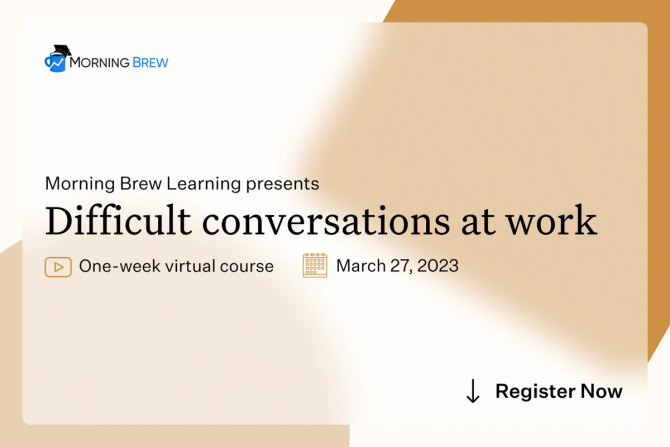Good morning. Yesterday was the first day of spring, which means we’ve officially started wearing the wrong jacket to work no matter the weather. Can’t believe we’re looking forward to the wardrobe simplicity of a blazing-hot summer.
—Charlotte Salley and Kaila Lopez
|
|
Wallace and Gromit/Aardman Animations via Giphy
Safe space: Have you low-key stalked your partner’s exes? We’ve all been there. And despite the risk of accidentally liking a pic from 2016, you’re actually building the valuable biz skill of understanding your competition. That’s right, you can now put your late-night Insta spiral on your resume—just don’t call us when you need a reference.
Whether you’re an individual contributor, a company accountant, or the gd CEO, competitor tea is crucial information to have. Understanding the orgs you’re facing will give you a leg up and help you protect your back.
- It helps you differentiate your company and work, orient yourself within the broader market, and anticipate strategic changes.
Sure, you could conduct a lengthy competitive analysis, but when you’re looking for the quick and dirty on your competitors, ask these three questions.
 What do customers say? What do customers say?
While you won’t have access to a competitor’s internal customer research, you do have the entire internet at your disposal—and people love to talk.
- Look at social accounts, Google reviews, Yelp, and product/service reviews on your competitor’s website.
- What are its customers happy with, and what are they bad-mouthing? How is your competitor navigating those issues, and how might you swipe some clients by filling those gaps?
 What’s the company hiring for? What’s the company hiring for?
Check out its careers page and take note of things like frequency of open roles, specific areas it’s hiring for, detailed job descriptions, and position qualifications.
- Bonus if the company is transparent about salary ranges. If it’s offering more competitive pay, how do you plan to keep your own team happy?
 How is it making money? How is it making money?
Unless your competitor is a public company, you’re going to need to stick with sleuthing.
- Dig around on the company’s website to understand what it sells and how it charges for things (and for how much).
- How is it financing operations? Is it relying on VC or other external funding? If so, that might put pressure on it to grow at all costs, which you may not have.
Having intel on your competitors helps you stay sharp out there—so grab a glass of cabernet and start scrolling.—CS
|
|
Paul Morigi/Getty Images
The National Cherry Blossom Festival is Washington, DC’s version of Mardi Gras—but fickle spring weather means the “peak bloom” prediction gets moved around more than your Uber’s estimated arrival time. This year the National Park Service ended up rescheduling festival events to start this past weekend—no small feat considering that, pre-pandemic, 1.5 million tourists flocked to see these trees.
Being flexible with the weather is one thing. Being flexible when your boss says they’ll need that document finalized a week earlier is another thing entirely. For moments when you can’t flip over desks, here’s how to be more flexible at the office:
-
Understand your current workload. When someone comes to you with a shifted timeline, you’ll need to know what else can get punted. Try classifying the work on your plate by highest priority and highest impact. Plus, it’s a good reminder that the lowest-priority and lowest-impact stuff could probably be pushed anyway.
-
Ask why. This is to understand the big picture for the shift, not to sound like a jerk. More info will help you avoid resentment and frustration, and it may even build buy-in.
-
Hold your ground. If there’s really no way to shift things, you’ve got to be able to say no and then justify why—so get comfortable being uncomfortable.
And remember: Being “flexible” isn’t code for reacting to coworkers who don’t have things together. Timelines will inevitably need shifting, but someone else’s lack of planning doesn’t have to mean a fire drill for you.
|
|
TOGETHER WITH MORNING BREW LEARNING
|
We’ve reached the sweet spot where March Madness bracket pools and Girl Scout Cookie season overlap, which means you’re either drowning in Thin Mints and over-informed about Marquette University or you’re mustering up the courage to say “no” to your coworkers.
We all dread having difficult convos at work—but they’re some of the most important things we can do to accelerate our careers. Morning Brew Learning’s one-week virtual course will give you the skills, experience, and confidence to develop yourself, your coworkers, and even your boss with stellar guidance.
It starts on Monday, so register today.
|
|
We’re three years into the pandemic, and it looks like hybrid work is the compromise we’re making with corporate America. But whether you’re pro-IRL or pro-WFH, the sad salad lunch on Monday and the laundry instead of lunch on Tuesday don’t make this feel like the best of both worlds.
Here are five ways to take control of your hybrid work life:
-
Embrace the “divorced parents” setup. Going back and forth from a hot desk to home office means lugging your tech with you every day—and that external keyboard isn’t doing your Telfar any favors. Try this minimalist backpack that has its own dedicated shoe pocket for your commute sneaks.
-
Sanity maintenance. You can’t take all your Post-its with you when you leave home. Use a task manager like Todoist to keep track of your scattered thoughts and hard deadlines no matter where you are.
-
Real books smell the best. If you’ve got a commute where you can zone out, try this weird thing we’re calling reading on paper. You can even continue once you’re cozy on the couch. Pick up Range by David Epstein for some career clarity and This Is Happiness by Niall Williams for quietly weeping on the 2 Train.
-
Deceptive pants. Want some continuity between fleece joggers one day and pressed chinos the next? Here’s the best of both—these with belt loops and these with a scooped hem.
-
Go on a food rumspringa. And now for the major mindset shift: When at home, you eat healthy. But on the days when you have to grind through the commute, you get to eat as much Chipotle as you want for lunch.
What tips did we miss? Reply to this email with your best hacks for managing your “shower optional” and “must shower” mornings.
|
|
Career Advice is where we ask industry experts about the best tactics that have helped them level up.
Lindsey Grillot is director of affiliate commerce at Ziff Davis, she’s a member of the Alumni of Learning Brew Advisory Board, and she lives in Connecticut. Here’s the best career advice she’s ever gotten:
“Take 5–10 minutes a day to catch up on industry news and emerging trends related to your business/competitors/clients, and share the information with others who’ll find it valuable.
This is such an easy, impactful way to provide value to your organization and management team, and it takes pretty much no talent or skill!
- Not only will your leaders and peers appreciate the information, but if you do this regularly, you’ll deepen your professional connections and build your reputation as a well-connected industry expert.
To apply this, read the Morning Brew newsletters [editor’s note: promise we didn’t ask her to say that], consider setting up Google keyword alerts, join industry Slack channels and LinkedIn groups, attend in-person panels or networking events, follow thought leaders on Twitter or LinkedIn, or listen to podcasts related to your industry.
- Next time you read or hear something interesting, consider who else in your professional network or organization would benefit from the information, and share it via Slack, email, etc.”
|
|


|
|
Written by
Charlotte Salley and Kaila Lopez
Was this email forwarded to you? Sign up
here.
Take The Brew to work
Get smarter in just 5 minutes
Business education without the BS
Interested in podcasts?
|
ADVERTISE
//
CAREERS
//
SHOP 10% OFF
//
FAQ
Update your email preferences or unsubscribe
here.
View our privacy policy
here.
Copyright ©
2023
Morning Brew. All rights reserved.
22 W 19th St, 4th Floor, New York, NY 10011
|
|


.gif)



